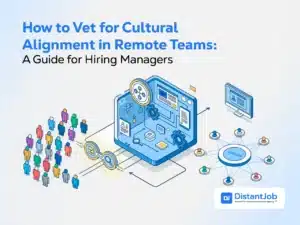Recruiting developers in 2025 in the US today is less about compensation and more about remote work, skills-based hiring, and headhunting. What no one tells you is that 81% of employed developers aren’t actively looking for jobs (Stack Overflow 2023). Yet while big tech throws $350K packages chasing the same 19% of active job seekers, smart companies are playing a different game. The data is clear: 65% of developers value learning and growth over brand names, and 58% rank flexibility above compensation. According to the Bureau of Labor Statistics, the U.S. will face a shortage of 1.2 million software engineers by 2026, while 66% to 90% of employers struggle to find the tech talent they need.
The competition is tough and best engineers aren’t on job boards – they’re heads down, building great products at their current jobs. The difference between good and great hiring? Knowing how to find and attract these hidden talents.
In this post, we will show you how to hire software engineers even though you don’t have FAANG-level salaries or global brand recognition.
Skills to Look Out For When Hiring a Software Developer
Before you bring a software engineer into your development team, you need to ensure they possess certain skills. They include:
Communication
With the rise of remote and hybrid work (14% work fully remotely, 29% work in a hybrid environment, according to Demandsage), communication has become crucial in software development. Whether it’s between developers or non-technical roles like designers, artists, QAs, or product managers, strong communication skills help share ideas and process others’ feedback.
Teamwork
Teamwork is the next level of communication—it’s about how well a developer fits into your business processes and culture. In software development, even if coding is done individually, developers need to collaborate through code reviews, pair programming, and meetings with other departments and stakeholders. When developers collaborate well, teams rate themselves 81% more successful, and leadership rates them 61% higher.
Specialized Skills
The trend in software development is moving toward skills-based hiring, where experience may outweigh formal degrees. The TestGorilla report stated that, as of 2024, 81% of all companies use skills-based hiring, but it is even more popular in the tech world, with 88% of companies adopting this effective recruitment strategy to build effective and diverse teams.
Always ask for a portfolio or GitHub account and verify their knowledge with a test, especially for advanced roles in AI or data science.
Problem-Solving
Software development is rarely linear; it often requires thinking outside the box. A developer needs to explore a problem, identify its cause, and find a solution. According to Robert Half, 90% of recruiting managers in tech have difficulty finding highly skilled professionals. By testing problem-solving abilities, you’ll avoid hiring candidates who are not suited for the role, saving you time.
Adaptability and Continuous Learning
The software development world is constantly changing with advancements in machine learning, security, and cloud solutions. Developers must be committed to continuous learning through boot camps and side projects, or even in-house by pairing them with senior devs.
Attention to Detail
Writing high-quality code and producing proper documentation is key in software development. Developers who pay attention to detail reduce bugs, security issues, and save on the cost of rewriting bad code.
Hire a Software Engineer in 10 Steps
Recruiting for any position is already tough, not to mention finding tech talent but with the right strategy, you can find software engineers that suit your needs.
Here are three phases of the software engineer hiring process:
Phase One: Pre-recruiting
1. Define Your Hiring Needs
The first step is determining the kind of software developer you need. You have many options, such as front-end developers who are more user-focused and back-enders specializing in server-side programming. Then, full-stack developers can handle front-end and back-end tasks.
If you need to build a mobile app, mobile developers are the logical choice. Likewise, web developers are the ideal option for web development projects. You may also seek experts like AI/machine learning engineers or DevOps professionals to fill specialized roles.
The one you choose will be influenced by your project scope, its complexity, and proposed technologies.
Afterward, you need to determine the flexibility and commitment you require from your potential hire. If it is a long-term commitment, hiring a full-timer who can focus solely on your project makes sense. Meanwhile, working with freelance software engineers is a suitable choice for short-term projects.
Once you’ve worked all of these out, you can set a realistic budget. Of course, your budget will be influenced by the project requirement, experience level, location, and current market rates.
One effective tip to cut costs is to consider hiring remote software engineers. This allows you to access global talent at more competitive rates while still maintaining high-quality output.
It is now time to prepare the job description.
2. Flip Your Job Description: Stop listing requirements. Instead, show impact
When writing a job description for a software engineer, start with a brief introduction about your company, including its mission and culture. Clearly state the job title and summarize the role, explaining what the engineer will do and how it fits into the team.
The most effective job descriptions focus on outcomes rather than just requirements. Instead of saying, “5+ years of Java experience required,” highlight what the candidate will achieve: “You’ll architect and implement scalable solutions that serve millions of users daily.”
Here’s how to create an impact-focused job description:
- Highlight Growth Opportunities: “You’ll lead the development of our next-generation AI-powered platform, mentoring junior developers along the way.”
- Showcase Real Challenges: “Help solve complex data processing challenges as we scale from handling thousands to millions of transactions per second.”
- Emphasize Impact: “Your code will directly improve user experience for over 100,000 daily active users.”.
Below is an example of what a compelling job description looks like:
Also, it is quite important to craft a narrative about your company that appeals to what senior engineers value. Engineers with experience tend to care about interesting problems to solve, a positive and empowering work environment, opportunities to grow, and respect for their employer. Be sure to add that in your job description.
3. Sourcing Methods: Find Senior Engineering Talent by Headhunting
While traditional job boards have their place, the most talented software engineers often aren’t actively job hunting but 50 % were open to new opportunities if learning and growth opportunities were presented( Stack Overflow Developer Survey). To effectively recruit top-tier software engineers, you need to:
- Headhunt them either on Linkedin or GitHub (search for developers contributing to projects similar to yours)
- Convince them that your job is much better than the one they currently (Highlight growth opportunities, decision-making authority, and potential career advancement paths within your company)
- Do this fast (others might be headhunting them as well)
And because remote work has become the norm, these individuals can work for any company around the world. That’s great news because it increases your pool of available candidates. But it also means that other companies could be competing for the same quality talent.
For a faster hiring you can always partner with specialized IT staffing agencies can work to your advantage. Agencies such as DistantJob, Near, and Redfish Technology focus on connecting companies with skilled developers. These firms have extensive networks of pre-vetted candidates, enabling them to match your project requirements with professionals who possess the necessary expertise, making the hiring process more efficient and faster.
This takes us to the next phase: hiring.
Phase Two: Tesing & Hiring
4. The Real Secret? Focus on screening candidates based on skills, not just resumes.
Skills-based recruitment leads to significant improvements in key recruitment metrics:
- 97% of tech employers make fewer costly poor hires
- 84% reduce cost-to-hire and 86% reduce time-to-hire.
- 91% improve retention and 93% improve diversity.
Focusing on skills instead of CVs shows whether the developer can actually do the job. CVs are often inaccurate and don’t tell you if the person can think quickly and problem-solve. Skills-based hiring also determines whether the developer can fit with your team.
Having this sin mind, evaluate these applications and create a shortlist of the most promising candidates. Now, conduct a screening call to discuss the candidates’ background, motivation, and fit for the role.
5. Assess Technical Skills
Organize technical interviews to evaluate the candidate’s problem-solving and design abilities. Don’t just run cookie-cutter software tests. Top talents don’t appreciate run-of-the-mill processes.
Instead, conduct tests relevant to your project or in real-life contexts. This way, you can assess the candidate’s ability to operate on the fly and handle unexpected challenges. Show that you respect their time by paying them to complete these assessments.
Let them critique your current architecture. As a result, you tell them that you trust their judgment and value their expertise. Another effective interview method is involving the candidate in product discussions. Doing so allows the candidate to visualize their potential impact and give them a taste of what working with your team would be like.
Finally, be transparent by giving them access to your whole team. When candidates interact with potential teammates, it gives them insights into your company culture and work dynamics.
6. Conduct Behavioral Interviews
While technical skills are important, you want a developer who can easily integrate with the team. So, ask behavioral questions. These questions help you understand a candidate’s personality and experience.
Examples of questions you can ask include:
- Name a challenge you’ve faced in the past and how you overcame it
- Tell me about a time when you had to deal with a co-worker who was behind on a project. How did you handle the situation?
- Think about a time when you disagreed with a client or stakeholder on a software engineering best practice. What did you do to resolve the situation?
- Describe the traits your ideal product team would have
7. Perform Background Check
This is a crucial part of the recruitment process. You don’t want to hire software developers with criminal or questionable backgrounds.
Contact the candidate’s reference to verify their performance. Vet their employment history and certifications to ensure they are legitimate and accurately represented.
You should also confirm that the candidate has no existing non-compete clauses that would prevent them from working for your company.
8. Move Fast with the Offer
Once you find the candidates, how do you hire fast, yet not compromise on quality? This is possibly the toughest balance to achieve. This can be done through structured interviews and tests.
So look at where you can remove steps in the process, use automation, initiate constant communication, and have an accelerated decision-making process. The solution will be a recruiting process that is both fast and of high-quality standards, consuming less resources and increasing the chances of hiring a senior person before the competition.
Why is it so important to have a quick streamlined process? It’s because the best engineers are being snapped up, and a long drawn-out recruiting process will result in losing many people throughout the process.
But in the end, if you want to improve your hiring process you need to stop relying solely on job boards, and considering hiring remotely.
Phase Three: Post-hiring
9. Onboard the Engineer
To ensure your new software developer hits the ground running, a well-structured onboarding process is essential.
Start with an orientation session emphasizing company values, work culture, and overall expectations. Next, provide access to tools and resources, such as codebases, documentation, and a laptop. If the new hire is a junior engineer, assign them a mentor or buddy to guide them through their initial days.
Creating a 30-, 60-, 90-day plan can also be beneficial during this period. It allows the new hire to gradually ramp up their responsibilities and become fully integrated into the team.
Finally, schedule regular meetings such as monthly feedback sessions, especially for remote developers.
10. Monitor Progress During Probation
Most organizations usually set a three-month probationary period to evaluate the new hire’s performance and fit within the team.
To execute this, define specific goals, offer consistent feedback, and ensure they’ve access to the necessary resources. At the end of the trial, carry out a comprehensive review. Then, decide whether or not to offer permanent employment based on their performance.
Is the ‘Shortage of Developers’ Actually a Thing?
All kinds of industries are demanding tech professionals. The Culprit?! Digitalization! If your business isn’t digital, it won’t survive for a couple of years. Currently, all kinds of companies are looking for the best tech talent to develop their websites or apps. And billions of companies are looking for the same thing as you: a talented software developer.
However, the shortage is not only based on average tech professionals. It’s based on quality rather than quantity. Most businesses want to recruit talented software engineers with exceptional skills. And the main problem is that talent is out there, but it’s harder to look for it.
Is it hard to recruit software engineers? As with anything, it depends on what you are looking for. But it becomes easier when you know how to avoid the most common mistakes when recruiting.
The first mistake companies tend to make is to stay within a defined radius, trying to find talent nearby when talent is everywhere with 26.9 million software developers worldwide. The second mistake is not knowing how or where to look for this talent. It’s at this point that IT headhunters are crucial for finding tech talent. They have the contacts, know the field from A to Z, and know exactly where to find the candidate you’re looking for. And I’ll let you in on a little secret between the two of us. The talent you are seeking? It’s not in the US. Why not consider hiring Eastern European developers?
Common Challenges in Recruiting Software Development Engineers
Recruiting software developers comes with a host of challenges and pitfalls that both business owners and recruiters should be aware of:
- Recruiters not being in the know: To have a successful recruitment process, your recruiters must know the business of the people they are trying to hire. Only then can they ask the important questions and filter the best people for the job.
- Not looking in the right places: software developer recruiters need to know how to find software developers. Depending on the technologies needed, there are online communities and even specific job listing sites that can help you find the people you need.
- Recruitment costs: A good recruitment strategy will inevitably add costs to the budget. It’s important to evaluate how much effort you are willing to spend and if you can afford it.
- High competition: Just like you, many other companies are looking for talented developers to bolster their ranks. It’s important to stand out from the pack, so candidates feel more enticed to accept your positions.
- Recruitment speed: If you take a long time to recruit someone, odds are they will find a position in another company. It’s of vital importance that your recruitment process is not only fast but maintains constant communication with your candidates to keep them in the loop.
Closer Look Into the U.S Software Development Engineers Situation
9 out of 10 business owners in The United States struggle to find and hire talented tech professionals. The big competitive companies with aggressive hiring goals swallow them all up like Willy munches on krill. This hits startups especially hard, as they find themselves competing with big brands that offer a bigger paycheck and better benefits.
Because of this talent shortage across the U.S, companies are willing to pay extremely high salaries. Let’s look at the graph below with the average salary (per year) across the states with the highest percentage of software developers:
| State | Average Salary for a Software Engineer |
| Virginia | $84,018 |
| Washington DC | $97,164 |
| Massachusetts | $86,942 |
| Maryland | $82,355 |
| Colorado | $84,988 |
| New Jersey | $74,581 |
| California | $106,259 |
| Delaware | $84,020 |
| New Hampshire | $74,549 |
Conclusion
Working with the right software engineer can be the difference between success and stagnation. So, ensure to find candidates who can communicate effectively, are problem-solvers, are meticulous, and have advanced technical skills. Then, follow the steps above to find a developer that suits your needs.
However, this is easier said than done. Recruitment is a lot of work for most businesses, especially when you want to hire a talented remote software engineer.
But why resign yourself to struggle and headaches during this process when there are much simpler solutions? Like… us!
We specialize in finding exceptional remote tech talent for companies like yours. Unlike traditional staffing agencies, we focus exclusively on placing vetted developers and IT professionals who thrive in remote environments.
Having placed thousands of developers across US companies, we understand that hiring remote tech talent isn’t just about matching skills – it’s about finding professionals who can deliver real value to your business. Whether you’re a startup needing your first senior developer or a growing company scaling your tech team, we ensure you get the right fit.
Here’s what sets us apart: if your new hire doesn’t meet expectations within the first 90 days, we’ll find a replacement at no additional cost. Book a call now to find out more.





